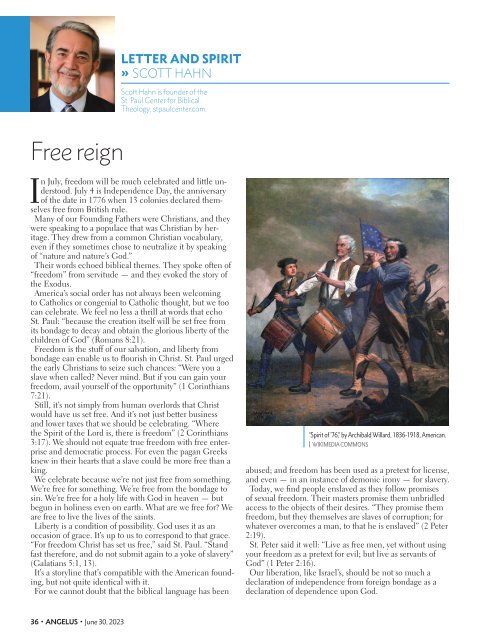Angelus News | June 30, 2023 | Vol. 8 No 13
On the cover: Everywhere you turn, it seems as if everyone is focusing on artificial intelligence — how it can be used, how it should be used, or if it should be used at all. Starting on Page 12, Elise Italiano Ureneck speaks with two Catholics experienced in artificial intelligence on how it could impact everything from education, well-being, and human demise.
On the cover: Everywhere you turn, it seems as if everyone is focusing on artificial intelligence — how it can be used, how it should be used, or if it should be used at all. Starting on Page 12, Elise Italiano Ureneck speaks with two Catholics experienced in artificial intelligence on how it could impact everything from education, well-being, and human demise.
Create successful ePaper yourself
Turn your PDF publications into a flip-book with our unique Google optimized e-Paper software.
LETTER AND SPIRIT<br />
SCOTT HAHN<br />
Scott Hahn is founder of the<br />
St. Paul Center for Biblical<br />
Theology; stpaulcenter.com.<br />
Free reign<br />
In July, freedom will be much celebrated and little understood.<br />
July 4 is Independence Day, the anniversary<br />
of the date in 1776 when <strong>13</strong> colonies declared themselves<br />
free from British rule.<br />
Many of our Founding Fathers were Christians, and they<br />
were speaking to a populace that was Christian by heritage.<br />
They drew from a common Christian vocabulary,<br />
even if they sometimes chose to neutralize it by speaking<br />
of “nature and nature’s God.”<br />
Their words echoed biblical themes. They spoke often of<br />
“freedom” from servitude — and they evoked the story of<br />
the Exodus.<br />
America’s social order has not always been welcoming<br />
to Catholics or congenial to Catholic thought, but we too<br />
can celebrate. We feel no less a thrill at words that echo<br />
St. Paul: “because the creation itself will be set free from<br />
its bondage to decay and obtain the glorious liberty of the<br />
children of God” (Romans 8:21).<br />
Freedom is the stuff of our salvation, and liberty from<br />
bondage can enable us to flourish in Christ. St. Paul urged<br />
the early Christians to seize such chances: “Were you a<br />
slave when called? Never mind. But if you can gain your<br />
freedom, avail yourself of the opportunity” (1 Corinthians<br />
7:21).<br />
Still, it’s not simply from human overlords that Christ<br />
would have us set free. And it’s not just better business<br />
and lower taxes that we should be celebrating. “Where<br />
the Spirit of the Lord is, there is freedom” (2 Corinthians<br />
3:17). We should not equate true freedom with free enterprise<br />
and democratic process. For even the pagan Greeks<br />
knew in their hearts that a slave could be more free than a<br />
king.<br />
We celebrate because we’re not just free from something.<br />
We’re free for something. We’re free from the bondage to<br />
sin. We’re free for a holy life with God in heaven — but<br />
begun in holiness even on earth. What are we free for? We<br />
are free to live the lives of the saints.<br />
Liberty is a condition of possibility. God uses it as an<br />
occasion of grace. It’s up to us to correspond to that grace.<br />
“For freedom Christ has set us free,” said St. Paul. “Stand<br />
fast therefore, and do not submit again to a yoke of slavery”<br />
(Galatians 5:1, <strong>13</strong>).<br />
It’s a storyline that’s compatible with the American founding,<br />
but not quite identical with it.<br />
For we cannot doubt that the biblical language has been<br />
“Spirit of ’76,” by Archibald Willard, 1836-1918, American.<br />
| WIKIMEDIA COMMONS<br />
abused; and freedom has been used as a pretext for license,<br />
and even — in an instance of demonic irony — for slavery.<br />
Today, we find people enslaved as they follow promises<br />
of sexual freedom. Their masters promise them unbridled<br />
access to the objects of their desires. “They promise them<br />
freedom, but they themselves are slaves of corruption; for<br />
whatever overcomes a man, to that he is enslaved” (2 Peter<br />
2:19).<br />
St. Peter said it well: “Live as free men, yet without using<br />
your freedom as a pretext for evil; but live as servants of<br />
God” (1 Peter 2:16).<br />
Our liberation, like Israel’s, should be not so much a<br />
declaration of independence from foreign bondage as a<br />
declaration of dependence upon God.<br />
36 • ANGELUS • <strong>June</strong> <strong>30</strong>, <strong>2023</strong>


















